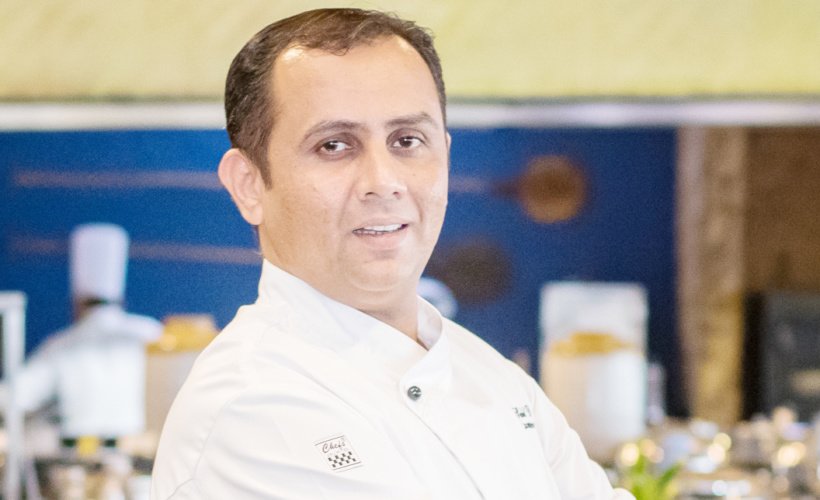
With over a decade of experience in the culinary world, Chef Sahil Desai has built a reputation for excellence in his profession
By ANNA FERNANDES
Chef Sahil Desai’s love affair with food began at an early age. In his words, “Food had always been part of our conversation within the family. My father was a big fan of food. I remember, every Sunday, he would sit at the dining table and decide the menu for the week ahead. He loved trying new and innovative cuisines, and I think I inherited my passion for food from him.”
Over the years, what started as a love affair, blossomed into a passionate career. With a Bachelor’s degree in hotel management from WGSHA – an ITC institute – Chef Sahil joined The Taj Group (with Taj Baroda) in 2003. And there was no looking back. He has conducted various food festivals in India and overseas and has acquired many a feather to his cap. After moving on to Taj Chandigarh, he went to Florida, in the USA, to pursue further education in the culinary arts, where he gained a great deal of knowledge about western food. He rejoined the Taj Group at Vivanta Panaji. Recently, he was appointed as the executive chef at Taj Holiday Village Resort & Spa, Sinquerim. He is well known for his dynamic personality and the passion he delivers through his food.
One of the primary reasons that drew the celebrated chef to the hospitality industry was, simply, the lack of monotony. In an industry, such as the hospitality industry, one has to constantly innovate to bring something new to the table. “I have always hated monotony. And the dynamic nature of this industry appealed to me. Every day is different. Every day is a new challenge,” he says, adding, “Of course, it is an extremely cut-throat and competitive industry. However, in competition, there is always scope for learning. Competition is vital to growth, and I believe it has brought me to where I am today.”
Chef Sahil sheds light on one of the major challenges plaguing the food industry in India today: sourcing ingredients. The industry is rapidly booming, says the chef, but the back-end supply chain is weak. Chef Sahil also draws attention to the importance of adhering to the norms laid down by the FSSAI (Food Safety and Standards Authority of India), “a brilliant idea, that should be vigorously followed by everyone in the industry.” He adds, “In a vast country such as India, despite having a legal framework in place, we still struggle with enforcing food safety norms and standards effectively. We should work towards implementing and streamlining this law so that everyone related to the industry from a local vegetable vendor to a poultry farm – everyone follows these norms. At Taj, we have partnered with the local FDA, in our endeavour to share our resources, hold training sessions and campaigns to spread awareness on these issues.”
Like all trends, international food trends have consistently been evolving. Innovation in the kitchen is the only way for that to happen. But some foods have stood the test of time. “Food is one industry that is constantly changing. There have been so many trends that have come and gone, such as molecular cuisines, liquid nitrogen, miniatures, and so on. But if you ask me, as of today, the food trends are going back to the basics – and when I say ‘basics’, I mean food trends tracing back to ‘the Vedas’. We are getting more conscious over what we are eating. The indigenous Vedic practices such as fresh and seasonal produce, natural fermentation, use of different spices are all finding their way into the menu today. For example, ‘haldi doodh’ is something that Indians have been consuming for generations and generations. Today, a ‘turmeric smoothie’ is a very popular drink in the west.” Chef Sahil adds that there are so many such indigenous Indian food practices and rare dishes that are forgotten today because of the India consumer’s preoccupation with adopting the western diet.
For Chef Sahil, maintaining authenticity when cooking world cuisines is key. He says, “You need to maintain the food culture and identity of a particular dish. You can plate it or serve it in a different style, but the flavours need to maintain the taste profile of the region.” Chef Sahil has been recognised for his comprehensive knowledge of international and Indian cuisine and innovative approaches to setting the stage for a customised dining experience.
The art of cooking requires more than just being able to follow a recipe. According to Chef Sahil, there are skills and techniques that must be honed. “I tell my team to focus on taste. Rather than blindly following a recipe, when it comes to cooking, you have to trust your gut and follow your taste buds. So, if a recipe calls for five red chillies, the actual number of chillies you add should be determined by your taste buds.” At the same time, Chef Sahil adds, that it is also important to stay true to the recipe one is following, and create an authentic dish that represents the cuisine being showcased.
Speaking about the aspect of food presentation, the chef says, “Many follow the concept of ‘whatever looks good, tastes good’. But I believe that that’s not necessarily accurate. I believe that the main priority should be taste. The presentation is secondary. Presentation is important to a certain extent, yes, but not at the cost of taste.”
Embarking on a culinary journey that began in 2003, Chef Sahil’s love for food continues to grow. “On my days off, when I’m travelling, I prefer to travel by road as it allows me to personally experience the essence of the culinary scene in every region, by trying out different dishes from small joints to prominent restaurants. I’m very experimental when it comes to eating. I have tried a variety of obscure dishes, such as alligator tail, ox tongue and so on.”
Speaking about the ingredients that a budding chef would require to make it big in the industry, Chef Sahil doesn’t sugarcoat the truth, “This is a very challenging and demanding industry. It is very difficult to maintain a balance between one’s personal and professional life. So, for an individual who wants to make it in this industry, a lot of dedication, patience and sacrifice is required”





